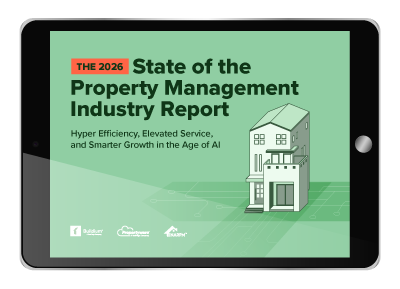New applications for AI seem to be springing up almost daily, across both our personal and professional lives.That includes the world of property management.
Start your free trial today!
Try Buildium for free for 14 days. No credit card needed.
Start Your TrialWhen used judiciously, AI can improve leasing, predict maintenance needs, enhance customer service and streamline common tasks. But what are the limits of what AI can do? And, perhaps more importantly, how much should property managers rely on AI-based technologies?
Let’s break down five key concerns around AI in property management and how to navigate them.
Concern #1: Defining What AI Can and Cannot Do
With all the buzz around AI, it can be difficult to distinguish the real benefits from the hype. To know where and how to use AI, you’ll first want to know what it can and can’t do.
What AI Can Do for Property Managers
Let’s start with what AI can do for property managers. Among other things, AI can:
- Generate working drafts of common communication assets such as emails or reports.
- Answer frequently asked questions from tenants using chatbots.
- Stage property listing photos and virtual tours with digital furniture and decor.
- Predict maintenance needs based on occupancy, usage, and building data.
- Extract important information from leases like expiration and renewal dates.
- Lower utility costs by adapting usage to outside temperatures and conditions.
- Draft compelling listing videos, descriptions, and advertisements for you to finetune.
For example: You can ask a large language model (LLM) such as ChatGPT to generate a listing description. Just give it the basics—here’s a sample prompt:
“Write a 150-word, captivating residential rental description for an 800 sq ft, 2-bedroom, 1-bathroom apartment located in downtown Seattle, featuring a modern kitchen, a spacious balcony with a city view, in-unit laundry, and proximity to public transport.”
You can also ask the LLM to match the tone to your audience—whether you’re targeting young business professionals or family-focused renters. From there, you’ll likely need to tweak the output with a few follow-up prompts and some final edits.
What AI Can’t Do for Property Managers
AI can’t fully replicate the human expertise needed to make final judgment calls. For example, in writing a listing description, AI could slip in an inaccurate property detail that would require a knowledgeable property manager to correct. AI still needs close human oversight, especially when you’re using its output to represent your company, brand, and clients.
The output of any AI is also only as good as the data fed into it. If you use AI trained on outdated housing market statistics, it could output inaccurate rental comps. Even if AI has the latest data, it cannot predict the future with 100% certainty. Unexpected surprises may prove AI forecasts wrong.
AI can’t fully replicate the emotions and nuanced dynamics of human relationships. As a result, property managers who over-rely on AI to handle all their tenant interactions may face unwanted consequences ranging from message feeling too cold or robotic to unintentional discrimination that may even violate fair housing laws.
Think of AI as a support tool—not a substitute for your expertise.
Concern #2: AI Data and Security Concerns
AI collects massive amounts of data to analyze patterns and make predictions. However, property managers should take steps to protect sensitive data and respect tenants’ privacy. Keep in mind that, while this advice can highlight what to look out for, taking a responsible approach to data security involves doing your own research and getting advice from legal professionals whenever you’re in doubt.
Let’s say you use AI to extract data from leases; you should only do so in a way that keeps tenants’ personal information safe. Similarly, if you allow online rental payments powered by AI, you must ensure that tenants’ payment information isn’t compromised. For these reasons, it’s best not to use AI when handling any sensitive tenant or client information. The same goes for any information you share with third-party vendors. Limit what data you share with them and always check that you’re compiling with data security standards and regulations.
Keep in mind that data security isn’t just a reputational consideration. It’s a legal concern, and some states have laws that could apply to your situation directly. For example, the California Consumer Privacy Act (CCPA) upholds consumers’ (including tenants’) right to know what data you collect from them and to opt out or delete it. Consult a legal professional and/or check your state regulations for similar data privacy protections to avoid unintended violations that could lead to hefty fines and other consequences.
Common ways to protect sensitive property or tenant data include:
- Creating strong passwords
- Enabling multi-factor authentication (MFA)
- Using end-to-end encryption
- Implementing access control
- Conducting regular audits
- Investing in antivirus and firewall software
- Educating staff on proper measures to avoid data loss, theft, and corruption
Concern #3: Losing the Human Element When Implementing AI
No matter how far AI advances, tenant relationships and trust still require a human touch.
Picture this: Two tenants get into a heated dispute over a noise complaint. An AI chatbot or automated response can’t resolve the conflict effectively, since those tools can’t bring the same empathy, emotional intelligence, and common sense to the situation that your team can. These kinds of disputes and similar sensitive issues are best left to you or a team member. It’s the best way to be sure you’re handling them with the right understanding, sense of fairness,and preference for de-escalation.
However, that’s not to say you should never use AI to communicate with residents. Many tenants may prefer a speedy AI answer to a routine question. The key is finding the right balance between what to outsource and what to take on yourself. By delegating routine communication to AI—and always keeping an open channel for tenants to reach your team directly—you can actually free up time to focus on the sensitive moments that underpin stellar customer service.
Concern #4: Ethical Considerations and the Risk of Bias
Avoid relying on AI to screen tenants or set rent prices. It poses a serious risk of introducing bias and potential discrimination to your leasing process.
If AI is trained to prioritize certain types of tenants, it could violate fair housing regulations that prohibit discrimination against tenants based on their race or color, religion, sex, national origin, familial status, or disability. Even a simple AI-generated property description that says a property or neighborhood is “great for families” could be discriminatory.
Similarly, AI trained on biased data could recommend setting suppressed rental rates, thereby reinforcing economic segregation and perpetuating past discriminatory practices such as redlining.
Concern #5: Falling Behind in the AI Race
AI has come a long way in the last few years. If you’re afraid of falling behind, you’re not alone.
The best way to get into AI is to start small. You don’t have to go all-in overnight. Take a close look at the different processes that contribute to your workload. If you haven’t already, consider starting with software that can automate some of those processes before introducing AI tools. Buildium is a platform that can automate some of the most time consuming property management tasks from maintenance tracking to accounting. It also has its own set of AI-powered features and a network of fully integration partners that put AI front and center, making it ideal if you want to introduce new technology in a measured, strategic way.
- Clyr lets you capture and upload receipts for property-related expenses and automatically categorizes them.
- STAN AI can respond to calls, texts, emails, and chats 24/7 to help residents book amenities, submit maintenance requests, report policy violations, and more.
- Inspectr uses AI to target maintenance inefficiencies in your operations. It runs diagnostics on your repair and maintenance workflows and forms recommendations that can save you time and money.
As tech in the property management industry continues to evolve, implementing AI into your business processes is a smart long-term strategy. To stay ahead with tech-supported workflows and service offerings, consider testing out Buildium’s comprehensive property management software with a free, no-risk 14-day Buildium trial or live guided demo.
By keeping up with the latest trends and technologies, you’ll be well positioned to grow and adapt.
Frequently Asked Questions
Will AI replace property managers?
No. While AI can automate routine tasks and provide data-driven insights, it cannot fully replace human judgment, empathy, and trust-building skills essential to property management.
Is it safe to use AI tools with sensitive tenant or financial data?
Only if used responsibly. Look for AI tools that prioritize security features like encryption, multi-factor authentication, and compliance with data privacy laws such as the CCPA or GDPR. Always consult a financial or legal professional for specific advice before introducing tech to sensitive parts of your business.
How can I start using AI in my property management business?
Start small with one or two tasks such as introducing a chatbot or generating listing description drafts. Consider using a comprehensive property management platform with AI-based capabilities and partner integrations such as Buildium.
Does using AI require me to collect more data from my tenants?
Not necessarily. Many AI tools work with data you already have in your property management software. That said, it’s always best to disclose what data you are collecting and how you are using it to build trust and stay compliant with relevant regulations.
Is there a risk of AI giving me incorrect information?
Yes. AI outputs are only as good as the data and instructions given to them. Always verify critical information, especially legal, financial, or tenant-facing content. If you fail to review AI output, you run the risk of making a serious and costly mistake.
Read more on Growth

